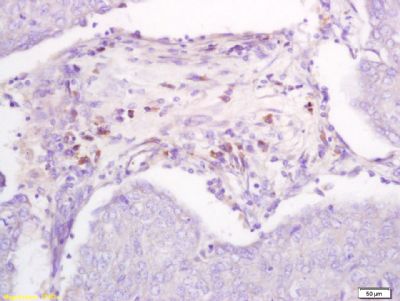DBC2 Polyclonal Antibody
Purified Rabbit Polyclonal Antibody (Pab)
- SPECIFICATION
- CITATIONS
- PROTOCOLS
- BACKGROUND

Application
| WB, IHC-P, IHC-F, IF, E |
|---|---|
| Primary Accession | Q9BYZ6 |
| Reactivity | Rat, Pig, Bovine |
| Host | Rabbit |
| Clonality | Polyclonal |
| Calculated MW | 83 KDa |
| Physical State | Liquid |
| Immunogen | KLH conjugated synthetic peptide derived from human DBC2 |
| Epitope Specificity | 631-727/727 |
| Isotype | IgG |
| Purity | affinity purified by Protein A |
| Buffer | 0.01M TBS (pH7.4) with 1% BSA, 0.02% Proclin300 and 50% Glycerol. |
| SIMILARITY | Belongs to the small GTPase superfamily. Rho family.Contains 2 BTB (POZ) domains. |
| Important Note | This product as supplied is intended for research use only, not for use in human, therapeutic or diagnostic applications. |
| Background Descriptions | DBC2 is a member of the recently identified RhoBTB family, which is part of the Rho GTPase family. DBC2 has been implicated as a tumor suppressor in breast and lung cancer. Studies have shown that DBC2 binds to the ubiquitin ligase scaffold Cul3, and that Cul3 regulates DBC2 protein levels by ubiquitinating DBC2 directly, leading to its degradation by the proteasome. |
| Gene ID | 23221 |
|---|---|
| Other Names | Rho-related BTB domain-containing protein 2, Deleted in breast cancer 2 gene protein, p83, RHOBTB2, DBC2, KIAA0717 |
| Target/Specificity | Ubiquitous, with highest levels in neural tissues. Expression is also detected in fetal lung, heart, and brain. |
| Dilution | WB=1:500-2000,IHC-P=1:100-500,IHC-F=1:100-500,IF=1:100-500,ELISA=1:5000-10000 |
| Format | 0.01M TBS(pH7.4), 0.09% (W/V) sodium azide and 50% Glyce |
| Storage | Store at -20 ℃ for one year. Avoid repeated freeze/thaw cycles. When reconstituted in sterile pH 7.4 0.01M PBS or diluent of antibody the antibody is stable for at least two weeks at 2-4 ℃. |
| Name | RHOBTB2 |
|---|---|
| Synonyms | DBC2, KIAA0717 |
| Function | Regulator of cell proliferation and apoptosis (PubMed:21801820). It likely functions as a substrate-adapter that recruits key substrates, e.g. MSI2, to CUL3-based ubiquitin ligase complexes for degradation (PubMed:15107402, PubMed:27941885). Required for MSI2 ubiquitination and degradation (PubMed:27941885). |
| Tissue Location | Ubiquitous, with highest levels in neural tissues. Expression is also detected in fetal lung, heart, and brain |

Thousands of laboratories across the world have published research that depended on the performance of antibodies from Abcepta to advance their research. Check out links to articles that cite our products in major peer-reviewed journals, organized by research category.
info@abcepta.com, and receive a free "I Love Antibodies" mug.
Provided below are standard protocols that you may find useful for product applications.
If you have used an Abcepta product and would like to share how it has performed, please click on the "Submit Review" button and provide the requested information. Our staff will examine and post your review and contact you if needed.
If you have any additional inquiries please email technical services at tech@abcepta.com.













 Foundational characteristics of cancer include proliferation, angiogenesis, migration, evasion of apoptosis, and cellular immortality. Find key markers for these cellular processes and antibodies to detect them.
Foundational characteristics of cancer include proliferation, angiogenesis, migration, evasion of apoptosis, and cellular immortality. Find key markers for these cellular processes and antibodies to detect them. The SUMOplot™ Analysis Program predicts and scores sumoylation sites in your protein. SUMOylation is a post-translational modification involved in various cellular processes, such as nuclear-cytosolic transport, transcriptional regulation, apoptosis, protein stability, response to stress, and progression through the cell cycle.
The SUMOplot™ Analysis Program predicts and scores sumoylation sites in your protein. SUMOylation is a post-translational modification involved in various cellular processes, such as nuclear-cytosolic transport, transcriptional regulation, apoptosis, protein stability, response to stress, and progression through the cell cycle. The Autophagy Receptor Motif Plotter predicts and scores autophagy receptor binding sites in your protein. Identifying proteins connected to this pathway is critical to understanding the role of autophagy in physiological as well as pathological processes such as development, differentiation, neurodegenerative diseases, stress, infection, and cancer.
The Autophagy Receptor Motif Plotter predicts and scores autophagy receptor binding sites in your protein. Identifying proteins connected to this pathway is critical to understanding the role of autophagy in physiological as well as pathological processes such as development, differentiation, neurodegenerative diseases, stress, infection, and cancer.


